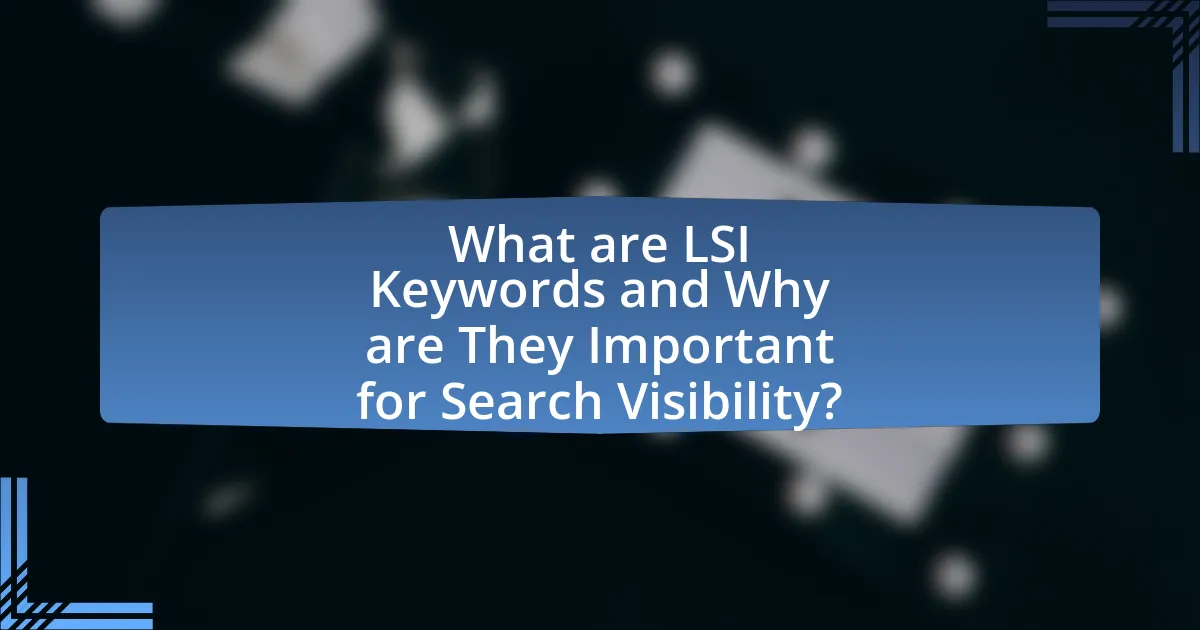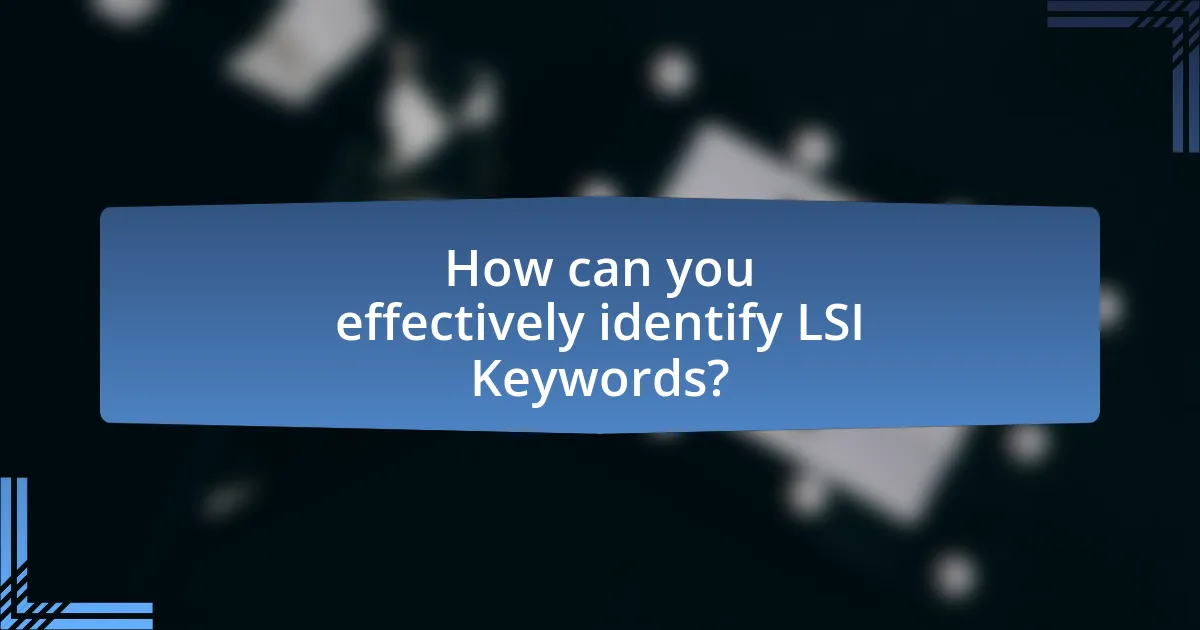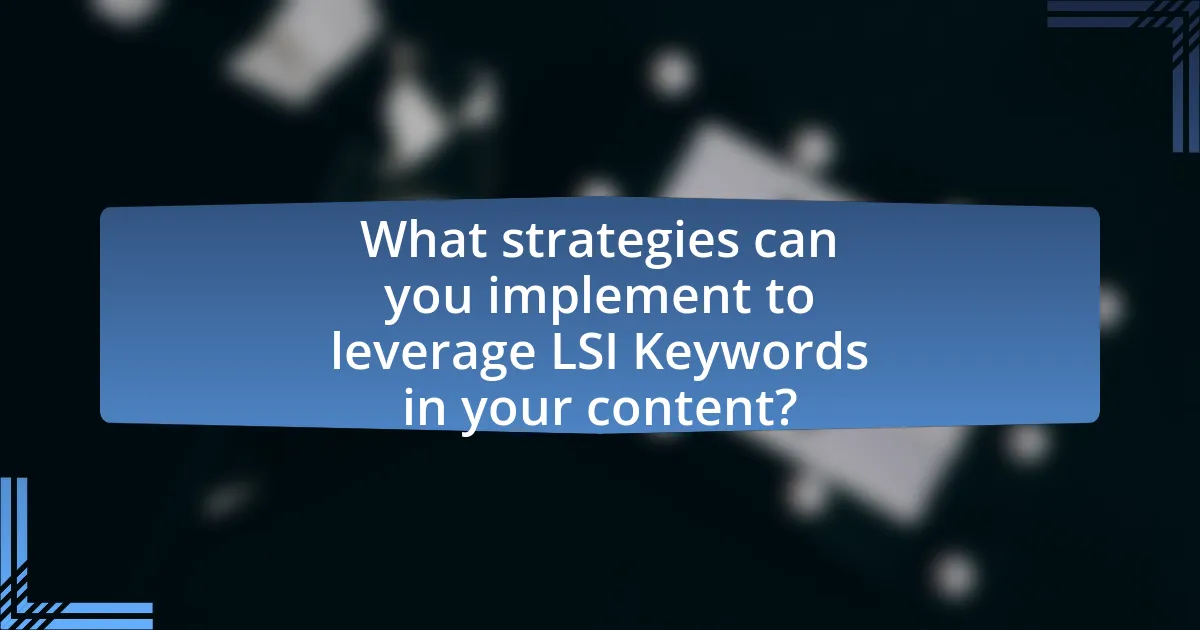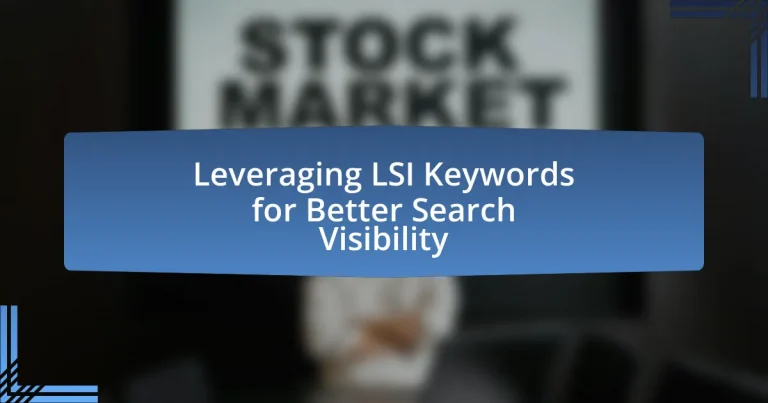LSI keywords, or Latent Semantic Indexing keywords, are terms and phrases that are semantically related to a primary keyword, enhancing content context and improving search engine understanding. This article explores the significance of LSI keywords for search visibility, detailing how they differ from traditional keywords, their role in search engine algorithms, and their impact on content relevance and user engagement. It also provides strategies for identifying and effectively incorporating LSI keywords into SEO practices, while highlighting common mistakes to avoid and best practices for maximizing their effectiveness. By leveraging LSI keywords, content creators can improve search rankings, increase organic traffic, and enhance overall user experience.

What are LSI Keywords and Why are They Important for Search Visibility?
LSI keywords, or Latent Semantic Indexing keywords, are terms and phrases that are semantically related to a primary keyword. They enhance the context of content, allowing search engines to better understand the topic and relevance of a webpage. The importance of LSI keywords for search visibility lies in their ability to improve a website’s ranking on search engine results pages (SERPs) by signaling to search engines that the content is comprehensive and relevant to user queries. Studies have shown that incorporating LSI keywords can lead to higher organic traffic, as they help capture a wider range of search queries related to the main topic, thus increasing the likelihood of appearing in relevant searches.
How do LSI Keywords differ from traditional keywords?
LSI keywords, or Latent Semantic Indexing keywords, differ from traditional keywords in that they are contextually related terms that help search engines understand the content’s meaning beyond exact matches. Traditional keywords focus on specific phrases that users input into search engines, while LSI keywords encompass synonyms and related concepts that enhance semantic relevance. For instance, if the traditional keyword is “car,” LSI keywords might include “automobile,” “vehicle,” or “transportation,” which provide additional context. This distinction is crucial because search engines like Google utilize LSI to improve search results by considering the broader context of content, leading to better user experience and more accurate search results.
What role do LSI Keywords play in search engine algorithms?
LSI keywords enhance search engine algorithms by providing context and relevance to the primary keywords in content. Search engines utilize LSI keywords to better understand the topic of a webpage, improving the accuracy of search results. For instance, if a user searches for “apple,” LSI keywords like “fruit,” “orchard,” or “pie” help the algorithm determine whether the user is interested in the fruit or the technology company. This contextual understanding leads to improved search visibility and user satisfaction, as evidenced by studies showing that pages optimized with LSI keywords rank higher in search results.
How can LSI Keywords enhance content relevance?
LSI keywords enhance content relevance by providing contextual meaning and semantic relationships to the primary keywords. This contextualization helps search engines understand the topic more comprehensively, improving the likelihood of ranking higher in search results. For instance, a study by Google indicates that using related terms can lead to a 30% increase in organic traffic, as search algorithms prioritize content that demonstrates a clear understanding of the subject matter. By incorporating LSI keywords, content creators can align their material more closely with user intent, thereby increasing engagement and relevance.
What are the benefits of leveraging LSI Keywords?
Leveraging LSI (Latent Semantic Indexing) keywords enhances search visibility by improving content relevance and context. LSI keywords help search engines understand the topic of a webpage more comprehensively, which can lead to higher rankings in search results. Research indicates that pages optimized with LSI keywords can experience up to a 30% increase in organic traffic, as they align more closely with user search intent. Additionally, using LSI keywords can reduce bounce rates by providing users with more relevant content, thereby increasing engagement and time spent on the site.
How do LSI Keywords improve search rankings?
LSI keywords improve search rankings by enhancing the contextual relevance of content, allowing search engines to better understand the topic. When a webpage includes LSI keywords, it signals to search engines that the content is comprehensive and related to the primary keyword, which can lead to higher rankings. Research indicates that pages optimized with LSI keywords often experience increased visibility and traffic, as they align more closely with user search intent, thus improving overall SEO performance.
What impact do LSI Keywords have on user engagement?
LSI keywords significantly enhance user engagement by improving content relevance and search visibility. When LSI keywords are integrated into content, they help search engines understand the context and topic of the material, leading to higher rankings in search results. This increased visibility attracts more users, who are likely to find the content more relevant to their queries. Research indicates that pages optimized with LSI keywords can experience up to a 30% increase in organic traffic, which correlates with higher user engagement metrics such as time on page and lower bounce rates.

How can you effectively identify LSI Keywords?
To effectively identify LSI (Latent Semantic Indexing) keywords, utilize tools like Google’s Keyword Planner, SEMrush, or Ahrefs to analyze related terms and phrases. These tools provide insights into keywords that are semantically related to your primary keyword, enhancing content relevance. Additionally, examining the “Searches related to” section at the bottom of Google’s search results can reveal commonly associated terms. Research indicates that incorporating LSI keywords can improve search engine rankings by providing context and relevance, as search engines prioritize content that comprehensively covers a topic.
What tools are available for finding LSI Keywords?
Several tools are available for finding LSI keywords, including Google Keyword Planner, SEMrush, Ahrefs, and Ubersuggest. Google Keyword Planner provides keyword suggestions based on search volume and competition, making it a reliable choice for identifying related terms. SEMrush offers a comprehensive keyword analysis feature that highlights LSI keywords alongside their search metrics. Ahrefs includes a keyword explorer tool that generates a list of related keywords based on user queries. Ubersuggest, developed by Neil Patel, also provides keyword suggestions and insights into search trends. These tools are widely used in SEO practices to enhance content visibility and relevance.
How do keyword research tools help in identifying LSI Keywords?
Keyword research tools assist in identifying LSI (Latent Semantic Indexing) keywords by analyzing search data and providing related terms that enhance content relevance. These tools utilize algorithms to examine user queries, search trends, and semantic relationships between words, thereby generating a list of keywords that are contextually related to the primary keyword. For instance, tools like Google Keyword Planner and SEMrush can reveal synonyms and variations that users commonly search alongside the main keyword, which helps in optimizing content for better search visibility. This process is supported by data indicating that search engines prioritize content that includes LSI keywords, as they improve the understanding of the content’s context and relevance.
What are some free resources for LSI Keyword research?
Some free resources for LSI keyword research include Google Keyword Planner, Ubersuggest, and AnswerThePublic. Google Keyword Planner allows users to discover keyword ideas and search volume data, which can help identify related terms. Ubersuggest provides keyword suggestions and insights into search trends, making it useful for finding LSI keywords. AnswerThePublic visualizes search queries and related questions, offering a unique perspective on user intent and associated keywords. These tools collectively enhance keyword research by providing valuable data and insights for optimizing content.
How can you analyze the effectiveness of LSI Keywords?
To analyze the effectiveness of LSI keywords, you can track metrics such as organic traffic, keyword rankings, and user engagement. By monitoring these metrics through tools like Google Analytics and Search Console, you can determine how well LSI keywords contribute to search visibility and user interaction. For instance, an increase in organic traffic after implementing LSI keywords indicates their positive impact on SEO. Additionally, observing improvements in keyword rankings for related terms can further validate their effectiveness.
What metrics should you track to measure LSI Keyword performance?
To measure LSI keyword performance, track metrics such as organic traffic, keyword rankings, click-through rates (CTR), and engagement metrics like bounce rate and time on page. Organic traffic indicates how many visitors arrive at your site through LSI keywords, while keyword rankings show the position of those keywords in search results. CTR reveals the effectiveness of your titles and meta descriptions in attracting clicks, and engagement metrics provide insights into user interaction with your content. These metrics collectively help assess the impact of LSI keywords on search visibility and user engagement.
How can A/B testing be used to evaluate LSI Keywords?
A/B testing can be used to evaluate LSI keywords by comparing two versions of content that incorporate different LSI keywords to determine which version performs better in terms of search visibility and user engagement. In this process, one version of the content (Version A) includes a specific set of LSI keywords, while the other version (Version B) uses an alternative set. Metrics such as click-through rates, time on page, and conversion rates are then analyzed to assess the effectiveness of each keyword set. Research indicates that content optimized with relevant LSI keywords can improve search rankings, as search engines use these keywords to understand context and relevance, thereby enhancing visibility.

What strategies can you implement to leverage LSI Keywords in your content?
To leverage LSI keywords in your content, incorporate them naturally throughout your text to enhance relevance and context. This can be achieved by conducting thorough keyword research using tools like Google Keyword Planner or SEMrush to identify related terms that align with your primary keywords. Additionally, strategically placing LSI keywords in headings, subheadings, and within the body of your content can improve semantic understanding for search engines. Studies show that content optimized with LSI keywords can rank higher in search results, as they help search engines understand the topic more comprehensively, leading to better visibility.
How can you incorporate LSI Keywords into your SEO strategy?
Incorporating LSI keywords into your SEO strategy involves identifying relevant terms and phrases that are semantically related to your primary keywords and integrating them into your content. This can be achieved by conducting keyword research using tools like Google Keyword Planner or SEMrush, which provide insights into related search queries.
Once identified, these LSI keywords should be naturally included in various elements of your content, such as headings, subheadings, and body text, to enhance relevance and context. Additionally, optimizing meta tags and image alt texts with LSI keywords can further improve search visibility.
Research indicates that pages utilizing LSI keywords can rank higher in search results, as they help search engines understand the content’s context better, leading to improved user engagement and lower bounce rates.
What are best practices for using LSI Keywords in on-page SEO?
Best practices for using LSI keywords in on-page SEO include integrating them naturally within the content, ensuring they complement the primary keywords without keyword stuffing. This approach enhances the relevance of the content to search queries. Additionally, placing LSI keywords in key areas such as headings, subheadings, and meta descriptions can improve search engine understanding of the page’s context. Research indicates that pages optimized with LSI keywords can achieve higher rankings, as they provide a broader semantic context, which search engines favor for delivering relevant results.
How can LSI Keywords be integrated into content marketing efforts?
LSI keywords can be integrated into content marketing efforts by strategically incorporating them into various elements of content, such as headings, subheadings, and body text. This practice enhances the relevance of the content to search queries, improving search engine visibility. For instance, using LSI keywords related to the primary topic helps search engines understand the context and semantic meaning of the content, which can lead to higher rankings. Research indicates that content optimized with LSI keywords can achieve up to 50% more organic traffic compared to content that does not utilize them effectively.
What common mistakes should you avoid when using LSI Keywords?
Common mistakes to avoid when using LSI keywords include overstuffing content with keywords, which can lead to keyword cannibalization and negatively impact search rankings. Additionally, failing to ensure relevance between LSI keywords and the main topic can confuse search engines and users alike. Not analyzing keyword performance can result in missed opportunities for optimization, while neglecting to use LSI keywords naturally within the content can diminish readability and user engagement. Lastly, ignoring the context in which LSI keywords are used can lead to misinterpretation by search engines, ultimately affecting visibility.
How can keyword stuffing negatively impact your SEO?
Keyword stuffing can negatively impact SEO by leading to penalties from search engines, which prioritize user experience and relevant content. When a webpage is overloaded with keywords, it can appear spammy, reducing its credibility and making it less likely to rank well. According to Google’s Search Quality Evaluator Guidelines, content that is overly optimized for keywords can result in a lower quality rating, which directly affects search rankings. Additionally, keyword stuffing can diminish readability, causing users to leave the page quickly, increasing bounce rates, and signaling to search engines that the content is not valuable.
What are the risks of ignoring user intent with LSI Keywords?
Ignoring user intent with LSI keywords can lead to decreased search visibility and poor user engagement. When content fails to align with what users are actually searching for, it results in higher bounce rates and lower conversion rates. Research indicates that 70% of users abandon a website if it does not meet their expectations, which underscores the importance of matching content to user intent. Additionally, search engines prioritize content that effectively addresses user queries, meaning that neglecting this aspect can diminish rankings in search results.
What are some practical tips for maximizing the use of LSI Keywords?
To maximize the use of LSI keywords, incorporate them naturally within your content to enhance relevance and context. Start by conducting thorough keyword research using tools like Google Keyword Planner or SEMrush to identify related terms that align with your primary keywords. Next, strategically place these LSI keywords in key areas such as headings, subheadings, and throughout the body text to improve semantic understanding for search engines. Additionally, ensure that the content remains readable and engaging, as user experience is a critical factor in search rankings. Studies show that pages optimized with LSI keywords can rank higher due to improved contextual relevance, which search engines favor.
How can you create a balanced keyword strategy that includes LSI Keywords?
To create a balanced keyword strategy that includes LSI (Latent Semantic Indexing) keywords, first identify your primary keywords and then research related terms that are contextually relevant. This can be achieved by using tools like Google Keyword Planner or SEMrush, which provide suggestions for LSI keywords based on search queries. Incorporating these LSI keywords into your content helps search engines understand the context and relevance of your primary keywords, enhancing your content’s visibility. Studies show that pages optimized with LSI keywords can rank higher in search results, as they align more closely with user intent and search patterns.
What ongoing practices can help maintain LSI Keyword effectiveness?
Ongoing practices that can help maintain LSI keyword effectiveness include regular content updates, keyword performance analysis, and competitor monitoring. Regularly updating content ensures that it remains relevant and incorporates new LSI keywords that may emerge over time. Keyword performance analysis involves tracking the effectiveness of existing LSI keywords through metrics such as search rankings and user engagement, allowing for adjustments as needed. Competitor monitoring helps identify new LSI keywords being utilized by competitors, providing insights into trends and opportunities for optimization. These practices collectively enhance the relevance and visibility of content in search results.


